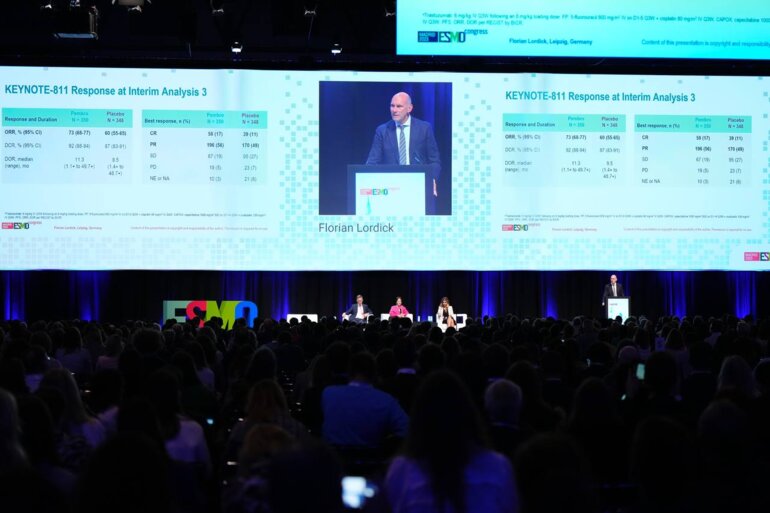ESMO Congress 2023

Phase III data confirm that adjuvant radiotherapy has no benefit following radical prostatectomy
Final results from the RADICALS-RT trial show that observation with salvage RT for prostate-specific antigen failure should be the current standard strategy after surgery

Checkpoint inhibition improves outcomes in high-risk, locally advanced cervical cancer
In the KEYNOTE-A18 study, the combination of pembrolizumab and concurrent chemoradiotherapy significantly improved progression-free survival

Sitravatinib plus nivolumab does not improve survival in NSCLC after immunotherapy and chemotherapy
The SAPPHIRE trial failed to meet its primary endpoint compared with chemotherapy

Longer PFS reported with a quadruple treatment regimen in EGFR- or ALK-mutated NSCLC
Promising data from the ATTLAS phase III study indicate a potential new approach for treating patients progressing on TKIs

Study shows noninferior overall survival with active surveillance compared with surgery in some oesophageal cancers
Findings from the SANO trial also reported clinically complete responses after neoadjuvant chemoradiotherapy

Data are still insufficient to recommend immune checkpoint inhibitors in perioperative therapy for gastric/gastro-oesophageal junction cancers
The impact of immunotherapy on disease progression and survival remains uncertain, but biomarker selection may be the future

First-line pembrolizumab combination significantly improves PFS in HER2-positive metastatic G/GEJ adenocarcinoma
Adding immunotherapy to standard of care shows benefit compared with placebo and is confirmed to be practice-changing for this patient population

Study data show a significant benefit of neoadjuvant immunotherapy in HR-positive early breast cancer for the first time
Efficacy of PD-1 inhibitors in this setting reflects that reported in triple-negative breast cancer and is confirmed by long-term data presented at the ESMO Congress

TIL therapy – an opportunity for a few centres?
Regulatory, practical and economic challenges are associated with implementing this personalised treatment on a larger scale, thus currently limiting its availability and accessibility to patients

Are we over-treating patients with locally advanced rectal cancer?
Recently presented results suggest that a subset of patients with early stage rectal cancer could skip pre-operative radiotherapy, thus raising some questions about the standard of care


